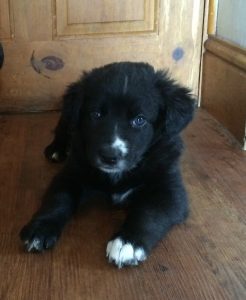How To Get A Puppy To Eat
"My Puppy Won't Eat!"
 This Holidays4Dogs article will provide some information, hints and tips for owners who are worried their new puppy isn't eating enough. It is in fact it is quite a common issue with new puppies who have just moved into a new environment – quite often they go off their food for a day or two. However, most people, especially first time dog owners are often concerned about this – Holidays4Dogs offers some general advice about finicky puppies, suggestions to tempt a pup to eat and help on deciding when you should seek veterinary assistance.
This Holidays4Dogs article will provide some information, hints and tips for owners who are worried their new puppy isn't eating enough. It is in fact it is quite a common issue with new puppies who have just moved into a new environment – quite often they go off their food for a day or two. However, most people, especially first time dog owners are often concerned about this – Holidays4Dogs offers some general advice about finicky puppies, suggestions to tempt a pup to eat and help on deciding when you should seek veterinary assistance.
It is often an upsetting time for a puppy when he moves away from his siblings and mother into a new environment – possibly completely on his own. He has new sights, sounds and smells to encounter and he may well feel a little stressed by all of this – a dog's appetite is usually the first thing to be affected if he is feeling anxious. Likewise, if your dog is excitable and thoroughly enjoying his new home, he may just be too excited to want to bother to stop and eat!
When you bring your new puppy home always make sure you have a supply of the food he has been used to and make any changes to his diet very gradual, so you do not cause any upset tummies.
If your puppy stops eating for more than two days, you will need to arrange to take your pup to the vet to establish whether there are any medical reasons for his loss of appetite. If your dog seems sickly or lethargic during this time and he refuses to drink also, you must take him to the vet immediately without delay.
In the meantime, as long as your pup seems fit and well there are a few things you can do to tempt him to start eating.
-
Try offering some lean chicken mixed with his usual food.
-
Sometimes something more pungent such as a small amount of grated cheese or peanut butter will tempt a puppy's appetite.
-
If his food is the dry variety you could try moistening it with a little warm water or sodium free chicken broth.
 The most important thing is not to worry too much in the first 24 – 48 hours when your new puppy is home, as long as he is otherwise bright and happy.
The most important thing is not to worry too much in the first 24 – 48 hours when your new puppy is home, as long as he is otherwise bright and happy.
Don't leave food down all the time for him, but remove any uneaten food and try again and hour or so later. You could try hand feeding your puppy, however this might encourage him to be all the more finicky and get into the habit of only eating his food in this way, so it is probably best to avoid doing this too often. If you decide to try this, pick the food from his bowl onto the palm of your hand, but keep your hand over his bowl so that he is encouraged to take the food himself.
Try not to feed him titbits in between his 'meals' as this will only dampen his appetite even more. Make sure he has enough exercise (but don't overdo it with very young pups).
If you have other dogs in the household, make sure they are not being pushy or putting the puppy off eating his food – feed adult dogs away from the pup if you think this is the case. Conversely, some pups will eat if they have 'competition' of other dogs in the vicinity, but do monitor the situation carefully when feeding dogs in the same area.
It can be a worry when new puppies won't eat, but this usually resolves itself after a day or two and is generally nothing to be concerned about.
If your pup seems lethargic and sickly and is not drinking – always consult your vet at the earliest opportunity.
How To Get A Puppy To Eat
Source: https://www.holidays4dogs.co.uk/my-puppy-wont-eat/
Posted by: staleywallst.blogspot.com

0 Response to "How To Get A Puppy To Eat"
Post a Comment